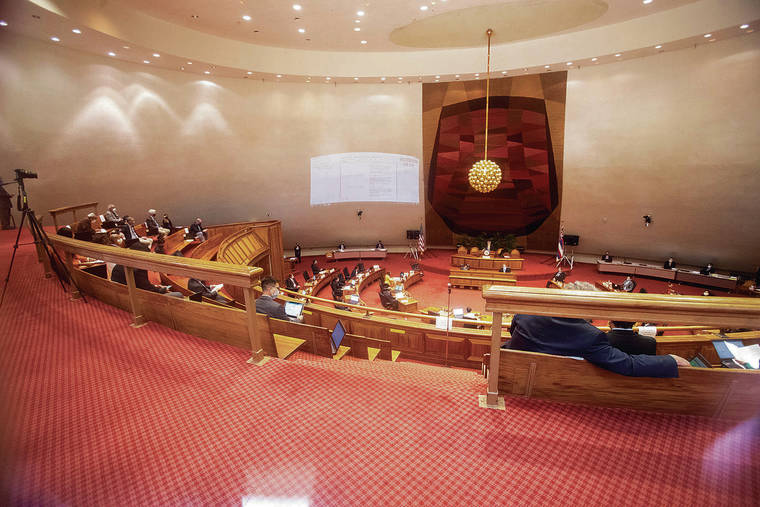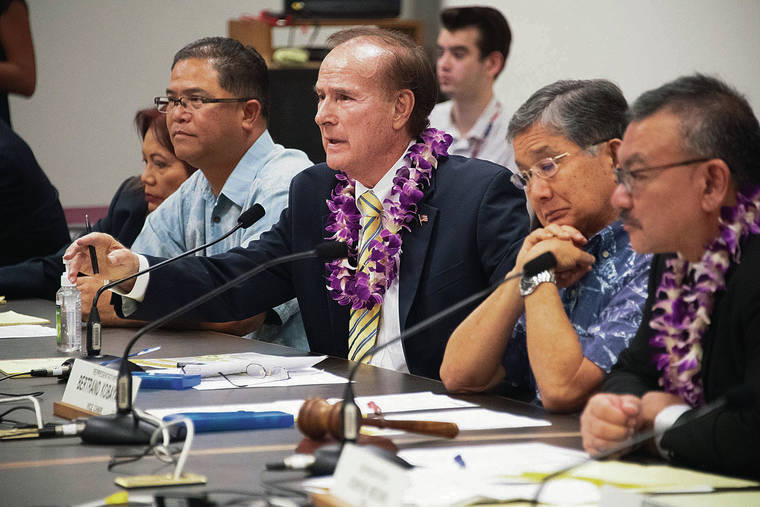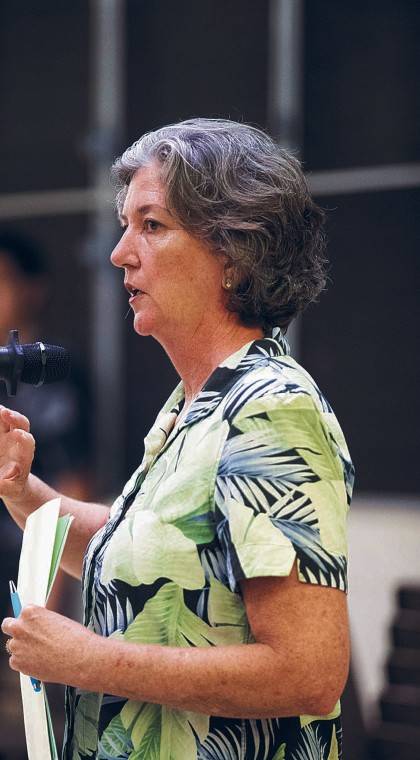Despite urgent social needs, Hawaii legislators decide to bank state and federal funds

CINDY ELLEN RUSSELL / MAY 11,
Hawaii lawmakers meet in the House of Representatives chamber at the State Capitol at the start of their session to deal with the coronavirus pandemic and its economic fallout. Media and the public have been kept outside of all the lawmakers’ hearings since the start of the session.

CRAIG T. KOJIMA / FEB. 3
“Putting it in the rainy day fund, we are the ones who tap it in and tap it out, and that’s really why that’s a good thing.”
Gene Ward (second from left wearing Lei)
House Republican minority leader, on stashing the funds

CINDY ELLEN RUSSELL / 2019
“I am ashamed that we did nothing with the money that we had.”
Laura Thielen
State senator, who gave an emotional Senate floor speech on why lawmakers aren’t granting CARES Act aid to needy or nonprofits that serve the needy



Lawmakers are poised to stash more than $1.6 billion in state and federal funding in the state’s “rainy day” budget reserve fund at a time when Hawaii residents are hurting from the highest unemployment rate in generations, prompting one state senator to tell her colleagues Tuesday she is ashamed of the Legislature for failing to help more people in need.
In an emotional Senate floor speech, Sen. Laura Thielen observed that New Hampshire, Vermont, Alaska, Montana and other states are using federal funds from the CARES Act to make grants to the needy or to nonprofits that serve the needy, while lawmakers here are depositing most of the state’s share of CARES money in the rainy day fund.
Nearly 250,000 Hawaii residents have filed for unemployment in less than two months, yet Hawaii has been “among the worst if not the worst state in the nation at getting people their entitled unemployment benefits,” she said. Most of the people who lost their jobs are low-wage service workers, Thielen said.
The coronavirus pandemic Opens in a new tab has effectively shut down tourism, and Hawaii has so far had 641 COVID-19 cases, including one new case of an adult on Hawaii island that was made public Tuesday. A total of 578 people have recovered and been released from isolation.
“This is the perfect storm. It’s the highest cost-of-living state. It’s workers with the lowest wages and the least amount of savings, and it’s the state that’s among the slowest to deliver unemployment payments to them,” said Thielen (D, Hawaii Kai-Waimanalo-Kailua).
In a voice choked with emotion, Thielen told her colleagues that “I am ashamed that we did nothing with the money that we had.” The CARES Act funding must be used to cope with the impact of the COVID-19 pandemic and must be spent by the end of the year.
Don't miss out on what's happening!
Stay in touch with breaking news, as it happens, conveniently in your email inbox. It's FREE!
Leading lawmakers have said they reconvened at the Capitol last week Opens in a new tab to develop a new package of state budget fixes that will make it unnecessary for Gov. David Ige to impose public-worker pay cuts and furloughs next year.
Last month the governor told leaders of the public-worker unions he intended to impose 20% pay cuts for state employees Opens in a new tab including teachers, a plan that is opposed by House Speaker Scott Saiki and Senate President Ron Kouchi.
Union leaders and others have argued that cutting the pay of public workers would do even more damage to the state economy and might make the downturn worse. Ige has said his administration must cope with a $1.5 billion budget shortfall over the next 15 months, while lawmakers contend the shortfall is only about $1 billion.
Lawmakers last week and this week went to work drafting a new budget that lapses unspent funds, strips funding from vacant positions and substitutes borrowed money for cash appropriations. The plan is to use those strategies and others to free up enough money to plug next year’s budget hole without imposing furloughs or pay cuts.
Senate Bill 75 Opens in a new tab would shift nearly $636 million in CARES Act money to the rainy day budget reserve fund, while Senate Bill 3139 Opens in a new tab would transfer $452 million in other state funds into the rainy day fund. SB 3139 also would authorize the Ige administration to transfer another $258 million to the budget reserve fund.
Senators are expected to take final votes on those bills Thursday and then recess in the days ahead, but lawmakers say they intend to reconvene at the Capitol next month to consider additional budget changes and other measures.
Representatives of Hawaii social service providers who spoke on condition that they not be identified said they were mystified by the approach lawmakers have taken.
“It’s a huge amount of money. We have thousands of families suffering now; we have literal bread lines; and we are a bit baffled about why you would not be pushing out a ton more money immediately into direct support for rent subsidies, for food, for small business relief — all of those things,” said one nonprofit provider.
Another recounted stories from community nonprofit operators who ran out of food at a distribution site while there was still a long line of cars waiting to be served, and another who fielded call after call from people seeking rent assistance after all of the available funding was exhausted.
Pushing out the available funding would help stimulate the local economy, and “that’s what other states are doing,” said a representative of one social service agency. “We have people really in need.”
Senate Ways and Means Committee Chairman Donovan Dela Cruz said the counties will provide the rent subsidies, direct food aid and business support that Thielen and other critics contend the state should be distributing.
The state has received $862 million in federal funding under the CARES Act to support state and local governments during the pandemic, and lawmakers are appropriating $80 million of that for Hawaii County, $66.5 million for Maui County and $28.7 million for Kauai County. Honolulu already has received a separate allocation of federal funding from the CARES Act.
The state share of the CARES money should go to the rainy day fund to offset the steep decline in state tax collections, Dela Cruz said.
The state does not know what sort of additional federal assistance it will get, “and the fact is we still have existing programs that address the very things that she brought up.” For example, lawmakers are providing $2 million to set up a new program to expand Supplemental Nutrition Assistance Program benefits, also known as food stamps, he said.
House Finance Committee Chairwoman Sylvia Luke said that “unless we shore up the budget … I can guarantee the first thing that will be cut will be a lot of purchase of services (contracts with nonprofits), which will impact a lot of social serv- ices.”
Hawaii is different from other states because it handles services such as social services, hospitals, education, emergency medical services and jails, which are all handled by the counties in most other states, Luke said.
“It is unfortunate that people including Sen. Thielen are not looking at the entire $1.25 (billion in CARES Act funding for Hawaii) amount because there is a great amount of coordination, and this is a time for all of us to work together, as opposed to being the antagonist and being the criticizer for certain things,” Luke said.
House Republican Minority Leader Gene Ward said that putting the CARES money in the rainy day fund “gives us control over it. We are the budgeting, we are the policymakers, and lot of the stuff that’s going on we don’t agree with, and therefore putting it in the rainy day fund, we are the ones who tap it in and tap it out, and that’s really why that’s a good thing.”
“Everybody’s on kind of a different sheet of music, and this puts the Legislature … front and center on the budgeting and the allocation of where the funds go,” said Ward (R, Kalama Valley- Queen’s Gate-Hawaii Kai). “The rainy day fund is a political move, at the same time a way of knowing that there’s going to be deliberation before it goes out. It’s not going to be a one-man, one-woman show, put the money here, put the money there. It’s going to be we, as a body.”
“We may do all that nonprofit and all that other stuff, but not right now,” he said.
Ward also said he approves of cuts that were imposed on the state Judiciary budget last week. “That was a shot across the bow; we took away a few million dollars because of the empty positions. We’re saying, ‘Hey, you guys, you want to let these prisoners out? We’re the ones who control your budget, watch it. We just cut you, we can cut you more.’”
The state Supreme Court set up a process during the pandemic for expediting the release of some jail inmates to try to prevent the spread of the new coronavirus in overcrowded state correctional facilities. The jail population was reduced by 802 inmates from March 2 to last week.
A spokeswoman for the state Judiciary declined to comment on Ward’s remarks Tuesday.



